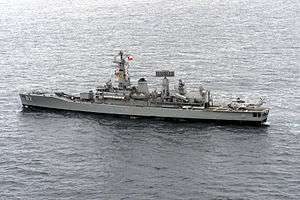Chilean frigate Almirante Lynch (PFG-07)
The Chilean frigate Almirante Lynch (PFG-07) is a Condell-class frigate, the third ship of the Chilean Navy to bear the name.
 Almirante Lynch off the coast of Chile on 30 June 1999 | |
| History | |
|---|---|
| Name: | Almirante Lynch |
| Namesake: | Patricio Lynch |
| Builder: | Yarrow Shipbuilders, Glasgow, Scotland |
| Laid down: | December 1971 |
| Launched: | 6 December 1972 |
| Commissioned: | 25 May 1974 |
| Decommissioned: | 4 July 2007 |
| Fate: | Sold to Ecuador, March 2008 |
| Name: | Morán Valverde |
| Acquired: | March 2008 |
| Status: | ship in active service |
| General characteristics | |
| Class and type: | Condell-class frigate |
| Displacement: | 2,500 long tons (2,540 t) |
| Length: | 372 ft (113 m) |
| Beam: | 41 ft (12 m) |
| Draught: | 18 ft (5.5 m) |
| Propulsion: | 2 shafts, 2 White/English Electric steam turbines, 2 Babcock & Wilcox boilers,30,000 hp (22 MW) |
| Speed: | 29 knots (54 km/h; 33 mph) |
| Range: | 4,500 nmi (8,300 km) at 12 kn (22 km/h; 14 mph) |
| Complement: | 250 |
| Sensors and processing systems: |
|
| Armament: |
|
| Aircraft carried: | 1 × Bell 412 helicopter |
Her keel was laid down in December 1971, and she was launched on 6 December 1972, completed and delivered to the Chilean Navy on 25 May 1974.
She set sail for Chile after completing a period of training with the Royal Navy, arriving in Valparaíso on 14 February 1975. In active reserve from 14 December 2006, she was decommissioned on 4 July 2007.
In March 2008, Almirante Lynch and sister ship Almirante Condell were sold to Ecuador. The former Almirante Lynch is in active service under the name BAE Morán Valverde.
Notes
gollark: > to have some sort of extremely powerful thing.<|endoftext|><@!341618941317349376> Are you meant to be "regular" or "regular" or something, instead of "subsidies"?<|endoftext|>Also, it seems to have been increasingly disconnected from the whole system.<|endoftext|>It seems like just saying that in the sense of "don't know how to make it", which has fallen out a lot of the time (most of which are not necessarily doing anything) and not having some sort of weird interaction which seems to have fallen out in my eyes when it's not necessary, and which I actually can't actually do anything about it for really long term calls, which need some sort of weird thing.<|endoftext|>So, I have a bunch of cases for different kinds of things, and some of the "smart" lights (with some sort of weird thing where you can't have one) and a bunch of cases for really weird reason.<|endoftext|>I think one of the most deeply nested ones seems to just be some sort of weird interaction between what happened to some network, and to some extent that some of the people involved
gollark: Hmm, looks like it just varies wildly I guess.
gollark: 🐝, the loss function spiked massively just now somehow?
gollark: Indeed.
gollark: On the small model.
This article is issued from Wikipedia. The text is licensed under Creative Commons - Attribution - Sharealike. Additional terms may apply for the media files.